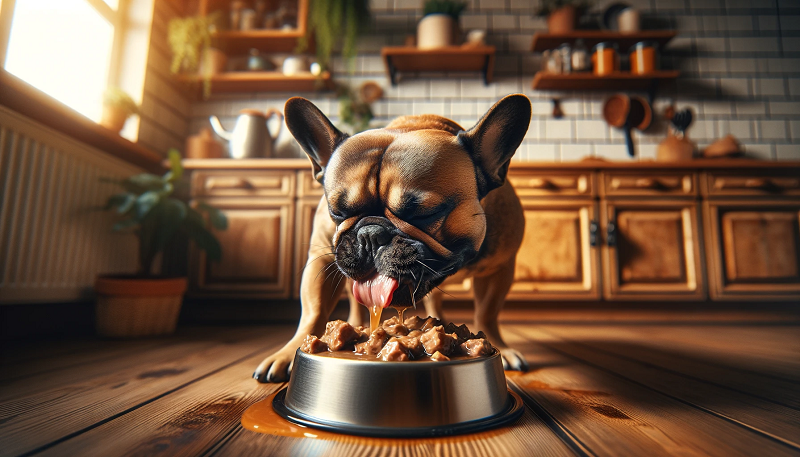Wet Dog Food
Wet dog food is a popular choice for those who prioritise providing their French Bulldogs with a balanced and nutritious diet.
Home » Diet & Nutrition » Dog Food Hub »

Written By
Sarah Taylor
Writer

Reviewed By
Ameilia Harrison
Nutrition

Reviewed By
Penny Worthington
Health
Page Last Updated: 3rd February 2024
On This Page
Quickly find and read what interests you the most using the links below:
Here, we’ll evaluate wet dog food, looking at its ingredients, how it’s made, the good stuff it offers, and what to think about when picking the best for your dog.
What’s in wet dog food?
Understanding what’s in wet dog food is important for making good choices about your dog’s diet. Here’s a closer look at its main parts.
Protein
Wet dog food benefits from high-quality animal proteins like beef, chicken, turkey, lamb, fish, and organ meats. These proteins give your dog essential amino acids for muscle repair and health.
Protein usually makes up 8% to 12% of the food’s weight, depending on the brand and type.
The protein source can affect your dog’s taste preferences and any potential allergies or sensitivities.
Carbs and fibre
Carbs in wet dog food come from rice, potatoes, peas, grains, and veggies. These carbs give energy and help with digestion.
They’re usually about 2% to 4% of the food’s weight.
Knowing the type and source of carbs can help if your French Bulldog has specific dietary needs or sensitivities.
Moisture
Wet dog food is unique because it has a lot of moisture, usually between 70% to 80% of the weight.
This moisture helps your dog get both food and hydration. Staying well-hydrated is essential to prevent urinary issues and keep your dog’s body working right.
The high moisture level is a big part of what makes wet dog food different and good for your dog.
Fats and good fatty acids
Wet dog food has healthy fats with essential fatty acids, especially omega-3 and omega-6.
These fats help your dog have great skin, a shiny coat, a sharp brain, and overall well-being.
The fat can vary from 2% to 8% of the food’s weight.
Understanding the fat and where it comes from can help if your dog has specific health needs or you want to keep their skin and coat looking their best.
How is wet dog food made?
Making wet dog food is carefully done to ensure it’s safe and high-quality. Here are the main steps.
- Ingredient selection. Good brands choose high-quality ingredients that are nutritious and top-notch. This is where the healthy foundation begins.
- Mixing and grinding. Ingredients are mixed and ground up well to ensure everything’s evenly mixed. This makes it easy for your dog to digest and enjoy the food.
- Cooking and safety. The food gets cooked at high temperatures to eliminate bad stuff like bacteria. Sometimes, canned wet dog food goes through extra steps to stay fresh longer.
Nutritional benefits of wet dog food
Wet dog food has several nutritional advantages contributing to your dog’s health and well-being. Let’s take a closer look at these benefits.
High-quality protein
Wet dog food provides top-notch animal proteins that are easy for your Frenchie to digest. Here’s why it’s important.
- Essential amino acids. These proteins contain essential amino acids vital for your dog’s body functions.
- Muscle health. They promote muscle development and efficient repair, which is crucial for puppies, active adult dogs, and those recovering from illness or injury.
- Overall wellbeing. A protein-rich diet keeps your dog healthy, agile, and strong.
Hydration
Wet dog food has a high moisture content, helping your dog stay hydrated. Here’s why it matters.
- Urinary health. Proper hydration prevents urinary tract issues by diluting urine and reducing the risk of crystals or stones.
- Temperature control. It aids in regulating your dog’s body temperature, especially during hotter weather or physical activity.
- Digestive aid. The moisture content supports smooth digestion, reducing the risk of digestive problems like constipation.
Balanced nutrition
Wet dog food is carefully formulated to meet the dietary needs of French Bulldogs at different life stages. Here’s why this matters.
- Essential nutrients. Wet dog food provides essential vitamins and minerals that support your dog’s health, including their immune system and bone health.
- Life stage tailoring. Formulas are designed for puppies, adult dogs, and seniors, with specific nutrients to support growth, activity, or joint health.
- Personalised nutrition. Understanding the nutrient balance helps you choose the right formula based on your dog’s age, activity level, and health, ensuring they get the proper nutrition for a healthy and long life.
Wet dog food offers high-quality protein, hydration support, and balanced nutrients.
These benefits contribute to your dog’s overall health, muscle development, and tailored nutrition for their specific life stage.
Choosing the right wet dog food can help your dog live a healthy and joyful life.
Choosing the right wet dog food
Your dog’s life stage and size is crucial when selecting the best wet dog food.
Different life stages and sizes have unique nutritional needs, and wet dog food options are designed to meet these specific requirements.
Puppies
Puppies are in a critical phase of growth and development, so their diet should provide essential nutrients in the right proportions to support healthy bone and muscle growth.
When choosing wet dog food for puppies, consider.
- Protein content. Look for formulations with higher protein content (around 12-15% by weight) to support muscle development and overall growth.
- Caloric density. Opt for options with slightly higher caloric density to meet the energy needs of active puppies.
- Balanced nutrition. Ensure the formula provides balanced nutrition with appropriate levels of vitamins and minerals for optimal development.
For Adult Dogs
Adult dogs have different nutritional requirements compared to puppies. When selecting wet dog food for adult dogs, consider.
- Protein content. Adult dogs typically need a moderate protein content (around 8-12% by weight) to maintain muscle mass and overall health.
- Caloric balance. Choose a formula that matches your dog’s activity level to maintain a healthy weight.
- Overall wellbeing. Look for wet dog food that offers a well-rounded diet to support your dog’s overall health and happiness.
For Senior Dogs
Older French Bulldogs may have specific dietary needs due to ageing. When picking wet dog food for senior dogs, consider.
- Protein and fat levels. Go for a formula with slightly reduced protein (around 7-10% by weight) and fat content to accommodate lower activity levels.
- Joint support. Consider options with added glucosamine and chondroitin to support joint health.
- Digestibility. Choose ingredients that are easy to digest to address potential digestive sensitivities that can develop with age.
Dietary restrictions
Every dog is unique; some may have dietary restrictions due to allergies, sensitivities, or specific dietary requirements. Fortunately, specialised wet dog food formulations are available to address these concerns.
Grain-free options
For dogs with grain sensitivities or allergies, grain-free formulas offer a solution. Instead of traditional grains, they use alternative carbohydrate sources like sweet potatoes, peas, or lentils.
When choosing a grain-free dog food, it’s essential to ensure that it still provides balanced and complete nutrition despite the absence of traditional grains.
Limited ingredient formulas
If your dog has food sensitivities, limited ingredient formulas can be a great choice.
These formulas contain only a few ingredients, making them suitable for French Bulldogs with specific dietary needs.
Typically, they feature a single protein source and a limited selection of carbohydrates.
When selecting a limited ingredient formula, carefully read the ingredient lists to identify potential allergens and choose formulas that exclude specific allergenic ingredients.
Hypoallergenic options
Hypoallergenic dog food comes to the rescue for dogs with allergies or sensitivities.
These formulas use novel protein sources such as duck, venison, or rabbit to minimise the risk of allergic reactions.
They are designed to eliminate common allergens, making them suitable for dogs with dietary restrictions.
Checking the ingredients
When picking wet dog food for your Frenchie, taking a closer look at the ingredients list is a good idea.
Checking what is in their food ensures that you’re making a choice that suits your dog’s dietary needs and overall health.
Here are some key things to consider when checking the ingredients.
Primary protein sources
The primary protein sources in wet dog food are a good indication of its quality and nutritional value. Here’s why they matter.
- Quality proteins. Choose wet dog food where high-quality animal proteins, like real meat (chicken, beef, fish, or turkey), are listed as the top ingredients. These proteins provide the essential amino acids for your French Bulldog’s muscle development, repair, and overall health.
- Protein digestibility. It’s not just about the source but also how easily your dog can digest proteins. Proteins should be highly digestible so your dog can efficiently absorb and use those essential amino acids, promoting overall health.
- Variety of protein sources. Some wet dog food may include various protein sources, which can add diversity to your dog’s diet and potentially lower the risk of food sensitivities or allergies.
Avoiding Fillers
Fillers, artificial additives, and preservatives can lower the nutritional value of wet dog food. Here’s why it’s essential to avoid excessive fillers.
- Nutrient dilution. Too many fillers, often in the form of grains, soy, or corn, can dilute essential nutrients in the food. This means your dog might need to eat more to get the necessary nutrition, potentially leading to overeating.
- Allergenic ingredients. Some fillers may cause allergies or sensitivities in certain dogs. Avoiding fillers reduces the risk of adverse reactions and ensures a diet your dog can tolerate well.
Natural ingredients
Opt for wet dog food that prioritises natural ingredients for your pet. Here’s it matters:
- Nutritional purity. Natural ingredients are usually less processed and retain more of their original nutritional value. This ensures your dog gets the most out of their food.
- Reduced allergy risk. Natural ingredients are less likely to trigger your Frenchie’s allergies or sensitivities than artificial additives or synthetic fillers.
- Healthier diet. Feeding your dog natural ingredients contributes to their health and well-being, improving digestion, coat quality, and overall vitality.
By checking the ingredients on the label, you can make an informed choice when selecting wet dog food.
Opting for high-quality, natural ingredients and avoiding excessive fillers and artificial additives ensures your dog receives the best nutrition, supporting their health and longevity.
Potential drawbacks of wet dog food
While wet dog food offers many benefits for your French Bulldog, it’s handy to be aware of potential drawbacks and address them thoughtfully. Here are some important considerations.
Cost analysis
Wet dog food is generally more expensive per serving than dry kibble. You can conduct a cost-benefit analysis to determine if it fits your budget effectively. Here’s how.
- Determine the price. Find out how much wet dog food costs a unit (e.g., can or pouch). Note the total quantity in the unit (e.g., ounces or grams).
- Calculate the cost per gram (or ounce). Divide the unit’s price by the total quantity to calculate the cost per ounce or gram of wet dog food.
- Repeat for dry dog food. Please do the same calculation for dry dog food by determining the price of a bag or container and dividing it by the dry food’s total weight (in ounces or grams).
- Compare the costs. Compare the cost per ounce or gram of wet dog food to dry dog food. This will help you understand the price difference between the two options.
Understanding the cost implications can aid in financial planning.
Shelf life
Once opened, wet dog food has a limited shelf life. It must be refrigerated and consumed within a few days to prevent spoilage.
Proper storage and portion control are essential to maintain product safety and quality.
Dental health considerations. Wet dog food’s soft texture may not provide the same dental benefits as dry food.
If wet food constitutes the primary diet for your dog, it’s important to address dental health through other means.
Common myths and misconceptions about wet dog food
Myth 1. Wet dog food is inferior to dry food in terms of nutrition.
Reality. Wet dog food can provide high-quality nutrition and hydration. Its moisture-rich content can benefit dogs, and it’s not inferior to dry kibble.
Myth 2. Wet dog food is too expensive for everyday feeding.
Reality. While wet dog food may be pricier per serving than dry food, it’s important to consider its benefits. Assessing the cost-effectiveness based on your dog’s specific needs can help make an informed decision.
Myth 3. Wet dog food causes dental issues.
Reality. Wet dog food’s soft texture may not provide the same dental benefits as dry kibble, but dental health can be addressed separately.
Myth 4. Wet dog food is only suitable for specific breeds or sizes.
Reality. Wet dog food can be suitable for dogs of all breeds and sizes. Tailoring your choice to your dog’s age, dietary needs, and preferences is more important than their breed or size.
Best wet dog food brands
There are many excellent brands of wet dog food available today. It would be unfair and unrealistic to crown just one as the ‘best’.
Final thoughts
As you know, your French Bulldog’s nutrition matters.
Make the right choice for their wet dog food, and you’re helping them stay healthy and happy!
About Frenchies
Breeding Guide
Buying Guide
Training Guide
Puppies
Appearance
Albino (Pink)
Black and Tan
Blue
Brindle
Chocolate
DNA Charts
Fawn
Fluffy
Hairless
Isabella
Lilac
Merle
Pied
Platinum
Sable
Teacup
Diet & Nutrition
Dog Food
Dry Dog Food
Fresh Dog Food
Gastrointestinal Dog Food
Grain-Free Dog Food
Hypoallergenic Dog Food
Low-Fat Dog Food
Organic Dog Food
Raw Dog Food
Wet Dog Food
Recipes
Dog Treats
Vitamins and Supplements
Grooming
Health & Wellbeing
Allergies
Anxiety
BOAS
Breathing
Butt
Cleft Palate
Coughing
Dental
Diabetes
Drooling
Ears
Exercise
Eyes
Fleas
Insurance
IVDD
Later Life
Neck
Neutering & Spaying
Nose
Over Heating
Paws
Pregnancy, Periods & Heat
Seizures
Shaking
Skin & Coat
Sleep
Spine & Legs
Stenotic Snares
Stomach
Tail

Terms of Use
Privacy Policy
GDPR Policy
Transparency Policy

